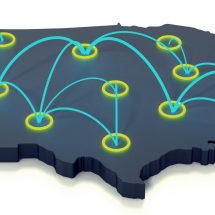If you’re a District of Columbia resident who is interested in becoming a licensed insurance claims adjuster, you’ve come to the right place!
D.C. is one of 16 states that do not license insurance adjusters. This means you can legally adjust claims in your state without a license, but only your state. Being unlicensed presents some major challenges if you’re serious about a career as a claims adjuster.
First, many employers will only deploy licensed adjusters. After all, they have clients (insurance carriers) all over the country so they need adjusters who can help wherever there is a need. Second, most adjusters want out-of-state licenses that will enable them to work throughout the entire country: hurricanes in the Gulf, hail in the midwest, snow and ice in the north. This is how to truly maximize your income potential as an adjuster.
Designated Home State (DHS) License
So how do you get a license in a state that doesn’t license? The Designated Home State, or DHS, license. A DHS license allows you to declare a licensing state as your home state. You will go through that state’s licensing process, testing, and compliance regulations and their license will act as your resident, or home state license.
Once you hold a DHS license, you’ll be able to use it to get reciprocal license privileges so you are more employable and can adjust claims in other states. Both are vital if you want to have a long-lived and successful career as a claims adjuster.
Which Adjuster DHS License is Best?
In today’s claims industry, many of the licensing states offer a DHS license. And you really can’t go wrong with any of them. If you’re a resident of a nonlicensing state, the priority is simply to get a DHS license. But we do have a favorite and a runner-up: Florida and Texas.
One of the main reasons we like these options is the ability to take your pre-licensing course and state exam (or exam exemption) online. So no matter where you live, it’s a breeze to complete the licensing process conveniently from your own home, on your own time.
How to Become an Insurance Adjuster in 5 Steps
Getting your home state or designated home state license is a great start. See what else it takes to establish a successful career in the insurance claims industry.
Florida 70-20 Nonresident Designated Home State License
Ultimately, obtaining Florida’s 70-20 license is our top recommendation for Ohio residents looking to become a licensed insurance adjuster. Here’s why:
- Florida offers the quickest turnaround time after you submit your documentation.
- A Florida DHS license is good for 4 years. That’s twice as long as most other DHS options.
- Florida requires fingerprinting which some states do not. Getting it done for your DHS license means you won’t have to worry about doing it later when you try to apply for reciprocal licenses in states that require it.
- The Florida 70-20 license is reciprocal with most licensing states and Puerto Rico.
Detailed information on the Florida 70-20 Designated Home State License is available on the Florida DFS Website.
AdjusterPro’s Florida Certified Adjuster Designation
If you’re ready to move forward with your DHS license, AdjusterPro has you covered. Our Florida Certified Adjuster Designation is 100% online and satisfies all state requirements. Simply complete the 40-hr pre-licensing course and pass the included exam and you are qualified to apply for your Florida 70-20 DHS license. No additional coursework or testing required.
You can find detailed licensing instructions and compliance information in our Florida DHS How-To Guide.
While Florida’s DHS is our top recommendation, our adjuster course and package also satisfy the DHS licensing requirements for Texas as well. See how to obtain that license in our Texas DHS Guide.
Obtaining your home state license is the first step to a career as an insurance adjuster. But if you’re looking to become an insurance adjuster in a nonlicensing state like D.C., the Florida 70-20 DHS License is the next best thing.
Once you have your DHS adjuster license, you can (and should) apply for reciprocal licenses so you can work in more states, making you more attractive to potential employers.
No matter where you’re at in your insurance adjusting career, we can help.



